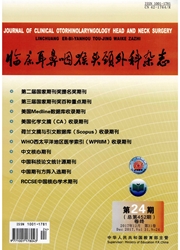

 中文摘要:
中文摘要:
目的:研究靶向人端粒酶逆转录酶(hTERT)的短发夹RNA(shRNA)对鼻咽癌细胞系(CNE)端粒酶活性及PCNA、Caspase-3蛋白表达的影响。方法:构建表达靶向hTERTmRNA特异的shRNA的质粒pEG—FP—shTERT。将pEGFP—shTERT转染CNE细胞,TRAPPCR—ELISA法检测端粒酶活性,MTT法测定细胞增殖活性,TUNEL法检测细胞凋亡,Westernblotting检测蛋白表达。结果:pEGFP—shTERT成功转染人CNE细胞后,端粒酶活性显著下降;细胞增殖活性明显受抑制;大量细胞凋亡;处理后24及48h,PCNA蛋白下调至64.41%、58.67%(P〈0.05),Caspase-3上调到1.55、1.60倍(P〈0.05)。结论:shRNA靶向抑制hTERT基因在鼻咽癌CNE细胞系中的表达,能显著地抑制细胞的端粒酶活性,调节PCNA和Caspase-3蛋白表达,从而抑制细胞增殖,并诱导细胞凋亡。端粒酶、PCNA和Caspase-3共同参与了鼻咽癌的发生、发展过程。
 英文摘要:
英文摘要:
Objective: Analysis of the correlation between telomerase and expression of its related proteins may provide insight into the molecular mechanism of nasopharyngeal carcinogenesis. Here, we investigate the effect of short hairpin RNA (shRNA) specific for human telomerase reverse transcriptase (hTERT) mRNA on the expression of proliferating cell nuclear antigen (PCNA) and Caspase-3 in nasopharyngeal carcinoma (CNE) cells. Metbod:shRNA expression vectors targeting the mRNA of hTERT were constructed. Cells were treated with the constructed expression vectors and telomerase activity was measured by telomeric repeat amplification ELISA (TRAPELISA). Cell viability was examined using the MTT assay. Cell apoptosis was detected by TUNEL method. The expression of PCNA and Caspase-3 proteins, was determined by Western blotting. Result: shRNA specific for hTERT mRNA significantly inhibited telomerase activity, suppressed cell viability and induced apoptosis in CNE cells. In addition, the expression of PCNA was inhibited, while the expression of Caspase-3 was up-regulated. Conclusion:Our results suggest that shRNA directed against hTERT inhibits cell viability by regulating telomerase activity and its related protein expression in NPC cells. Therefore, RNA-interfering technology may be a promising strategy for the treatment of nasopharyngeal cancer.
 同期刊论文项目
同期刊论文项目
 同项目期刊论文
同项目期刊论文
 期刊信息
期刊信息
